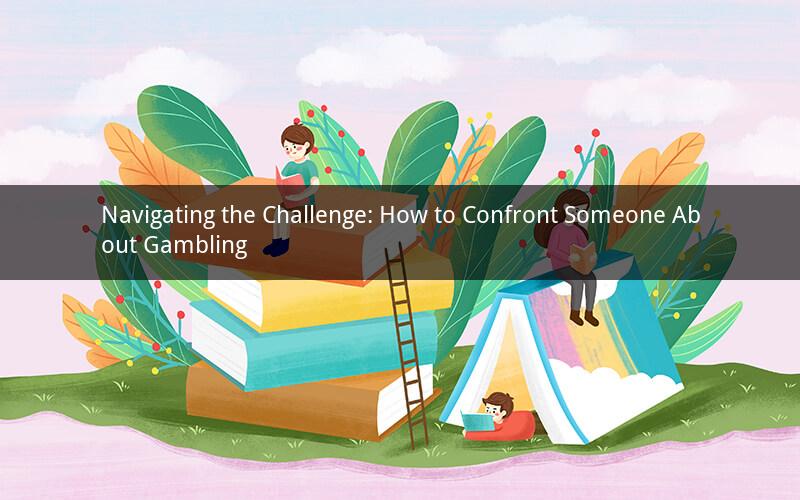
In today's society, gambling has become an increasingly prevalent issue, affecting millions of people worldwide. Whether it's a friend, family member, or colleague, confronting someone about their gambling addiction can be a daunting task. However, it's crucial to address the issue and provide support to help them overcome this challenge. This article will discuss the steps you can take to confront someone about gambling and offer guidance on how to approach the situation with sensitivity and care.
1. Understand the Problem
Before you can confront someone about their gambling addiction, it's essential to have a clear understanding of the problem. Familiarize yourself with the signs and symptoms of gambling addiction, such as preoccupation with gambling, loss of control over betting, and an increasing need to bet more money to achieve the same thrill. Understanding the problem will enable you to provide more effective support.
1.1 Signs of Gambling Addiction
- Preoccupation with gambling: Constantly thinking about gambling, planning how to bet, or reliving past gambling experiences.
- Loss of control: Unable to stop gambling, even when you know it's causing harm.
- Increasing need to bet: Feeling the need to bet more money to get the same thrill or to recoup losses.
- Emotional and financial consequences: Relationship problems, job loss, and financial difficulties due to gambling.
2. Choose the Right Time and Place
Timing and location play a significant role in the success of a confrontation. Choose a moment when the person is relaxed and not under the influence of alcohol or drugs. A private setting can help ensure the conversation remains focused on the issue at hand.
2.1 When to Confront
- When the person is calm and not in a state of emotional turmoil.
- When there's no external pressure or stress.
- After the person has experienced a negative consequence of their gambling.
2.2 Where to Confront
- A private setting, away from distractions and interruptions.
- A comfortable and familiar place, such as a quiet room or a park.
- Somewhere the person feels safe and secure.
3. Be Prepared for Emotional Reactions
Confronting someone about their gambling addiction may evoke a range of emotions, including denial, anger, and sadness. Be prepared for these reactions and try to remain calm and supportive throughout the conversation.
3.1 Common Emotional Reactions
- Denial: Refusing to acknowledge the problem or blaming others for their situation.
- Anger: Blaming you or others for bringing up the issue.
- Sadness: Feeling overwhelmed and despairing about their situation.
4. Use a Non-accusatory Approach
When confronting someone about their gambling addiction, it's essential to avoid being accusatory or confrontational. Instead, use a non-accusatory approach to express your concerns and offer support.
4.1 Non-accusatory Techniques
- Start with "I" statements: "I'm worried about you" instead of "You have a problem."
- Express your feelings: "It upsets me when I see you gambling" instead of "You're gambling too much."
- Focus on the behavior, not the person: "Your gambling is causing problems in our relationship" instead of "You're a problem gambler."
5. Offer Support and Encourage Professional Help
Once you've addressed the issue, it's essential to offer support and encourage the person to seek professional help. Provide information about available resources, such as counseling services, support groups, and hotlines.
5.1 Ways to Offer Support
- Be a listening ear: Let the person express their feelings and concerns without judgment.
- Offer practical help: Assist them in finding professional help, such as counseling or support groups.
- Encourage them to take small steps: Set achievable goals to help them overcome their addiction.
6. Stay Involved and Be Patient
Overcoming a gambling addiction is a challenging and lengthy process. Stay involved in your friend's or family member's journey and be patient with their progress. Celebrate small victories and continue to offer support even when setbacks occur.
6.1 Maintaining Involvement
- Regular check-ins: Keep the lines of communication open and offer support as needed.
- Encourage participation in support groups: Help them find a community where they can share their experiences and receive encouragement.
- Attend counseling sessions: Offer to accompany them to sessions to provide additional support.
Frequently Asked Questions
Q1: What if the person I'm confronting becomes defensive or aggressive?
A1: Remain calm and composed. Reiterate your concerns without getting defensive or confrontational. It may take time for the person to open up, so be patient.
Q2: How can I encourage someone to seek professional help?
A2: Offer information about available resources, such as counseling services and support groups. Be supportive and assure them that seeking help is a sign of strength, not weakness.
Q3: Should I confront the person alone, or is it better to involve others?
A3: It's best to confront the person alone initially. However, you can involve others if the person is resistant to change or if you feel overwhelmed by the situation.
Q4: Can I confront someone about their gambling addiction if they're not ready to face it?
A4: Yes, you can still confront them and express your concerns. However, be prepared for the possibility that they may not be ready to address the issue immediately.
Q5: How long should I wait before confronting someone about their gambling addiction?
A5: There's no specific timeframe for when to confront someone. The best time is when you're both calm and when the person is less likely to be under the influence of alcohol or drugs.